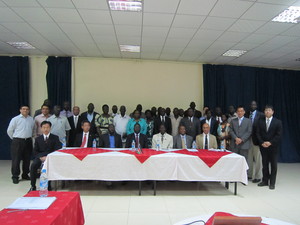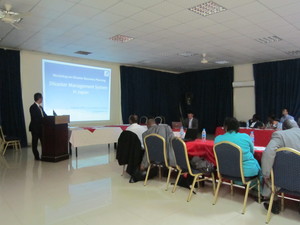25-27 Sep 2013, Juba, South Sudan
 Contributing to the critical stage of institution-building in a new country - South Sudan, IRP/ADRC, in collaboration with the Intergovernmental Authority on Development (IGAD), had facilitated a workshop on disaster recovery planning held at Juba Grand Hotel, 25-27 September 2013. It was the third workshop for Eastern Africa under the EC-funded project "Strengthening Region-based Capacities in Disaster Recovery Planning", which is implemented by UNISDR through IRP/ADRC.
Contributing to the critical stage of institution-building in a new country - South Sudan, IRP/ADRC, in collaboration with the Intergovernmental Authority on Development (IGAD), had facilitated a workshop on disaster recovery planning held at Juba Grand Hotel, 25-27 September 2013. It was the third workshop for Eastern Africa under the EC-funded project "Strengthening Region-based Capacities in Disaster Recovery Planning", which is implemented by UNISDR through IRP/ADRC.
About 25 high-level officials from different ministries of the Government of South Sudan (GoSS) participated in the workshop to explore options of recovery from disasters and conflicts. In addition, representatives of international organizations, specifically WHO, JICA, and UNEP also participated to make sure that the workshop encapsulates local knowledge as well as regional and international experiences. At the opening, several dignitaries delivered important messages to the participants. These included key officials from GoSS, namely Honorable Mr. Monywir Arop Kuol, Undersecretary Ministry of Health of South Sudan; Honorable Mr. Peter Lam Both, Chair of Relief and Rehabilitation Committees; and Honorable Mr. Clement Dominic, Undersecretary, Ministry of Humanitarian Affairs and Disaster Management. Moreover, Mr. Masatoshi Yokkaichi, Director Disaster Preparedness, Public Relation, and International Cooperation, Cabinet Office of Japan (also the Vice-Chair of IRP and the Chair of ADRC Steering Committee) graced the opening. Other dignitaries who were at the dignitary table were Mr. Keflemariam Sebhatu, Program Manager, Humanitarian Affairs, IGAD and Mr. Sanjaya Bhatia, Knowledge Management Officer of IRP.
 Like the previous workshops, various aspects of recovery planning were discussed. In particular, options and strategies to "build back better" after long-drought, heavy flooding, and conflict were explored using local and global cases as reference. IRP/ADRC partners from WHO Ethiopia, WHO South Sudan, UNEP South Sudan, Hyogo Prefecture, and the Cabinet Office of Japan (CAO) had sent experts to help facilitate the workshop and share lessons on recovery. Among the key recovery challenges facing South Sudan include provisions of basic services (specifically water and housing), peace and security, livelihoods, and governance. After almost four decades of civil conflict with Sudan, about 4 million people were displaced from their homes - many of the South Sudanese refugees are still abroad. While a Comprehensive Peace Agreement (CPA) was reached in 2005, some issues of peace and security remain unresolved including oil transport, allocation of oil revenues, and border demarcation that sometime lead to fighting. Common livelihoods activities such as farming and livestock are facing issues pertaining to markets and social facilities. And as a new country, the GoSS is at the critical stage of institution-building and state consolidation. In this context, the workshop was delivered on an opportune time to contribute in state consolidation through recovery planning. The lessons on recovery, as compiled by IRP/ADRC from various experiences around the globe, provided an additional input to build on the existing government initiatives. The key output of the workshops is the consolidated strategic recommendations for recovery plan for drought, flood, and conflict.
Like the previous workshops, various aspects of recovery planning were discussed. In particular, options and strategies to "build back better" after long-drought, heavy flooding, and conflict were explored using local and global cases as reference. IRP/ADRC partners from WHO Ethiopia, WHO South Sudan, UNEP South Sudan, Hyogo Prefecture, and the Cabinet Office of Japan (CAO) had sent experts to help facilitate the workshop and share lessons on recovery. Among the key recovery challenges facing South Sudan include provisions of basic services (specifically water and housing), peace and security, livelihoods, and governance. After almost four decades of civil conflict with Sudan, about 4 million people were displaced from their homes - many of the South Sudanese refugees are still abroad. While a Comprehensive Peace Agreement (CPA) was reached in 2005, some issues of peace and security remain unresolved including oil transport, allocation of oil revenues, and border demarcation that sometime lead to fighting. Common livelihoods activities such as farming and livestock are facing issues pertaining to markets and social facilities. And as a new country, the GoSS is at the critical stage of institution-building and state consolidation. In this context, the workshop was delivered on an opportune time to contribute in state consolidation through recovery planning. The lessons on recovery, as compiled by IRP/ADRC from various experiences around the globe, provided an additional input to build on the existing government initiatives. The key output of the workshops is the consolidated strategic recommendations for recovery plan for drought, flood, and conflict.
(2013/10/3 14:30)

